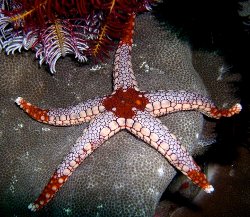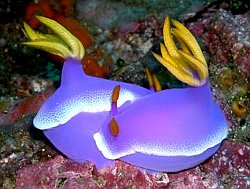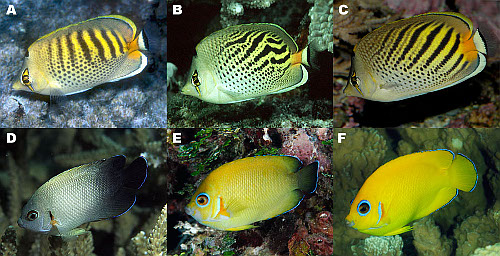SICB Annual Meeting 2011
January 3-7, 2011
Salt Lake City, UT
Symposium: Speciation in Marine Organisms

(Photo by Anuschka Faucci)
I. Symposium Overview
One hundred and fifty years after the publication of Darwin’s “On the Origin of Species”, speciation remains one of the most important, and least understood, topics in evolutionary biology. The vast majority of what is currently known about the patterns and processes of species originations derives from studies of terrestrial or freshwater species, which usually inhabit environments that are geographically very heterogeneous. This fact might account for the great importance that students of speciation attribute to allopatric speciation, and to vicariant phenomena in promoting it. Marine organisms, on the other hand, are normally found in environments where geographic barriers are supposed to be much rarer, and in any event, of very different nature from those that their terrestrial and freshwater counterparts may encounter. For these reasons, the mechanisms that drive speciation in terrestrial and freshwater taxa may be different from those that act in marine species, and the patterns of speciation may be significantly different as well.
II. Sponsors
DEDB, DEE, DIZ, DESB and American Microscopical Society

(Photo by Anuschka Faucci)
III. Symposium Objectives
Our symposium on speciation in the sea will bring together experts of different marine taxonomic groups, including fish, various invertebrates such as corals, mollusks and sponges, protists, and algae, and of different disciplines, all united by the common interest in speciation. We invited population geneticists, systematists, paleontologists, and ecologists who will be able to address the challenge of investigating marine speciation from different angles. We hope that the different expertise of the speakers will bring a new and integrative approach to the topic, and result in stimulating presentations and discussion. The symposium fits in the grand challenges in organismal biology as presented by Schwenk et al (ICB 49(1), 2009) in several ways. It addresses questions regarding the linkage between organism-environment interactions, adaptation, response to ecological factors and their role in shaping the origin of diversity in the sea. It also fits into the understanding of how genomes produce organisms, discussing the processes behind the generation and evolution of phenotypic diversity associated (or not) to speciation events in the sea.
Finally the input from a wide range of experts and their own different approach to the same fundamental question brings attention to the need of an interdisciplinary and integrative effort toward a better understanding of complex processes such as speciation.
IV. Symposium Organizers
Maria Pia Miglietta (University of Notre Dame)
Francesco Santini (University of California, Los Angeles)
Anuschka Faucci (University of Hawaii at Manoa)
V. Symposium Speakers
S3.1 Tuesday, Jan. 4, 08:00 MIGLIETTA, Maria Pia*; FAUCCI, Anuschka; SANTINI, Francesco:
Speciation in the sea: an introduction to the symposium
S3.2 Tuesday, Jan. 4, 08:30 LESSIOS, Harilaos:
What have DNA molecules told us about speciation in the sea?
S3.3 Tuesday, Jan. 4, 09:00 PHILLIPS, naomi e:
Speciation in the sea from an algal perspective
S3.4 Tuesday, Jan. 4, 10:00 BERNARDI, G.:
Sympatric speciation in the sea
S3.5 Tuesday, Jan. 4, 10:30 BIRD, C E*; HOLLAND, B S; BOWEN, B W; TOONEN, R J:
Diversification of sympatric broadcast-spawning limpets (Cellana spp.) within the Hawaiian archipelago
S3.6 Tuesday, Jan. 4, 11:00 MCCARTNEY, MA*; SCHMIDT, VS:
Assortative fertilization across hybrid genotypes promotes reproductive isolation in a bimodal hybrid zone between Mytilus blue mussels
S3.7 Tuesday, Jan. 4, 11:30 PUEBLA, Oscar*; GUICHARD, Frédéric; BERMINGHAM, Eldredge:
Pairing dynamics and the origin of species
S3.8 Tuesday, Jan. 4, 13:00 JABLONSKI, D.*; BERKE, S.K.; KRUG, A.Z.; TOMASOVYCH, A.; ROY, K.; VALENTINE, J.W.:
Range expansion and speciation in the dynamics of the marine latitudinal diversity gradient
S3.9 Tuesday, Jan. 4, 13:30 MAGGS, Christine A*; MINEUR , Frederic:
Speciation in red algae: current challenges
S3.10 Tuesday, Jan. 4, 14:00 RUNDELL, R.J.*; LEANDER, B.S.:
Speciation in marine microeukaryotes
S3.11 Tuesday, Jan. 4, 14:30 ROCHA, Luiz A:
Next-generation sequencing and population genomics: an outlook for the future of speciation studies

Examples of hybridization in the genera Chaetodon and Centropyge: A, Chaetodon punctatofasciatus; B, C. punctatofasciatus X C. pelewensis hybrid; C, Chaetodon pelewensis; D, Centropyge vrolicki; E, C. vrolicki X C. flavissimus hybrid; F, Centropyge flavissimus
(Photo by Luiz Rocha)

